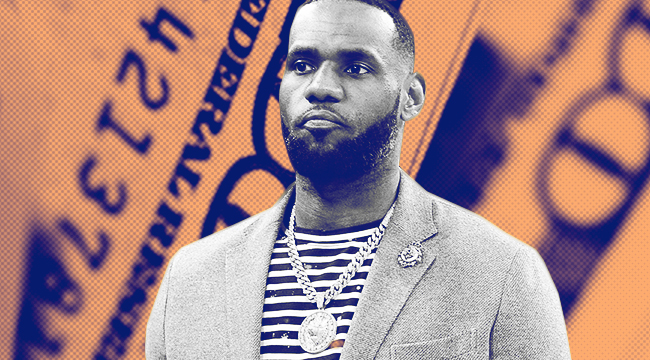
There are four words that define LeBron James, a statement regarding his role in society that goes beyond being one of the greatest basketball players to ever live: “More than an athlete.” James’ unique talents on the hardwood are matched and, in some cases, surpassed by the work he’s done off the court, where he’s acquired wealth through a myriad of business ventures that gives him as unique of a portfolio as anyone to ever take a court, field, or any other venue upon which sports occur.
From the time James was a highly-regarded high school basketball player in Akron, ESPN’s Brian Windhorst has documented his journey. He’s written extensively about James’ basketball career, but in his upcoming book, “LeBron, Inc.: The Making of a Billion-Dollar Athlete,” Windhorst takes a deeper dive into his off-court activities and how lessons learned over the course of his life have gotten the Los Angeles Lakers star to a point where he is, perhaps, the savviest businessman of any professional athlete in the world today.
The book touches on a number of moves James has made off the court, from his initial negotiations with sneaker companies at the start of his NBA career (spoiler alert: he signs with Nike), to a series of shrewd business moves involving, among other organizations, Liverpool Football Club and Beats headphones, to where he is now as an emerging entertainment mogul with aspirations of improving the lives of those less fortunate, Windhorst gives as comprehensive of a look as you will find into James’ various business dealings.
Prior to the book’s release on Tuesday, April 9, Windhorst sat down with Dime for a conversation regarding what readers can find inside.
The place we have to start: Why write this book now?
That is exactly what Maverick Carter said to me. He said, “Why write it now? We’re just really sort of at the beginning of our journey.” And I said, “Because you guys have done some things that have changed the game.” And there have been some business stories and business profiles done. Forbes did a story at one point. I think he did a profile with Fast Company. Maverick participated in a Harvard case study, which in his world is kind of a big thing. But there had never been anything comprehensive done like this on their business.
I think that if it was up to them, I would have waited until Space Jam was a huge success, or they had sold Uninterrupted for $500 million, or something like that. And so I what said to him, I was like, “Well, Maverick, you guys have done a lot here, and if you are further successful down the line, we can write another book down the line.” But in all honesty, the last book that I wrote was a best seller, and it was because the story was so wonderful, which was the story of their 2016 title. I mean, on the last page, they won. If you were a LeBron, or a Cavs fan, it had a happy ending, and the publisher was interested in another LeBron book, and I just didn’t want to do another book about LeBron and basketball.
This is what was interesting me, not only the business decisions LeBron’s made over the last 10, 12 years, but the pivot that they’re making to him being a media mogul. Just like he’s been the leader on the court, he’s been a kind of a leader off the court, and I just wanted to, frankly, go through another … I wanted to stretch my legs in another direction, so that’s one of the reasons why I went this route.
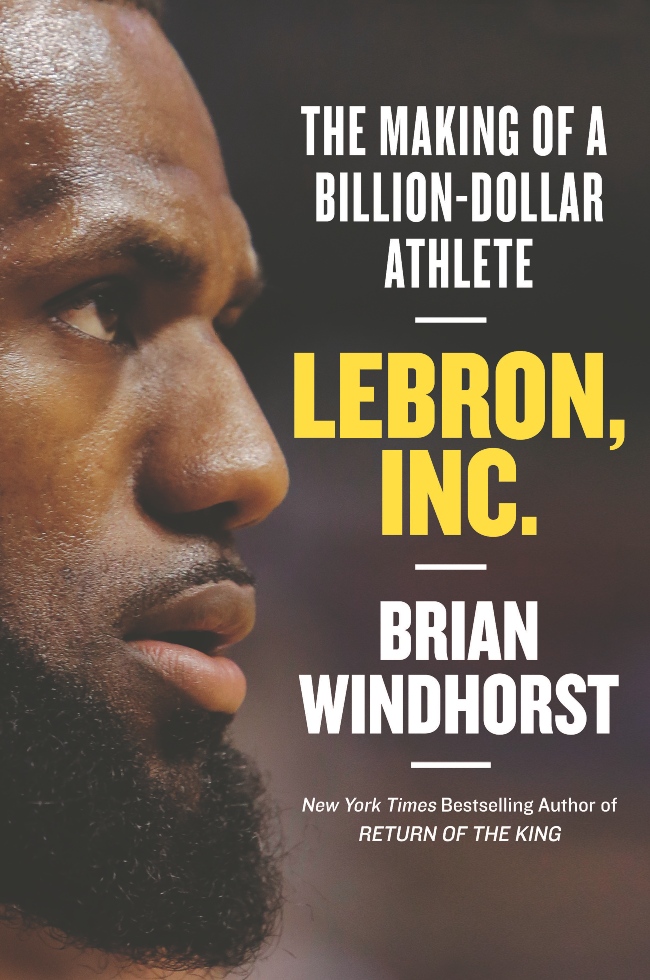
Do you think you could have written this book if he didn’t go to Los Angeles?
Oh, yeah. I did the book contract long before he was in L.A. In fact, I think when I sold the book in October of 2017, I remember telling them, “You know, he might go to L.A. next year.” And we discussed whether we’d want to delay the book or not. We ultimately decided not to, but it was just kind of like Space Jam. He was gonna make Space Jam this summer whether he was with the Lakers or not. Now, there may be other projects that come up because he’s in L.A., but a lot of this stuff was already rolling down the tracks before the move.
You do mention in the L.A. chapter, LeBron going to Miami was a basketball decision, going to Cleveland was a legacy decision, the move to L.A. was a business decision. So, it’s very interesting to hear that, no matter what, this was happening. The move to L.A. kind of makes it seem … I don’t want to say a little more appropriate, but it’s like, “Oh, okay. That makes a little sense that the book would come out now.”
Put it this way, he is now thinking about business way more than he did even three, four years ago. Because when he first got back to Cleveland, he actually kind of froze most of his business projects for a while because he was super focused on basketball. There was even a time where they basically were talking deals with some people, and they were like, “You know what, LeBron is just hitting pause right now because he wants to focus on basketball.”
And when I say stuff like that, I think one of the things that LeBron has talked about in the past, he has used this quote a hundred times, and he took it from Pat Riley — I don’t know if Pat Riley was the originator of this quote, but Pat Riley was the person who really popularized it. “Keep the main thing the main thing.” And what LeBron means by that, chasing championships, winning basketball games. So, just like when he goes to China on Nike business, he makes sure that they build in time every day for him to work out.
Much like Michael Jordan, part of the deal for filming Space Jam is that they will have a full basketball court available on, or near the set, so that he can go have workouts built into his shooting schedule. So, basketball is never far from his mind. But business now takes up a lot of the time when the basketball gets put down.
To you what’s more interesting, LeBron’s basketball career, or his business career? Or can you not really separate those two things when you’re talking about him?
Today, I am more interested in the business. But clearly, if the man wasn’t so great at putting the basketball in the hoop, and helping others put the basketball in the hoop, none of this would be possible. But I am fascinated by … they have made some deals that are pretty cool. And I’m interested to see as he sort of goes into the twilight of his career, soon enough he won’t be able to leverage his basketball play, he’s gonna have to leverage his business play. And that’s where Magic, and Michael, and now even Kobe are doing really, really well. LeBron is going a different path than those guys, and I am super fascinated to see how it goes.
And so really for me, it was just something to get interested in to start a project like this.
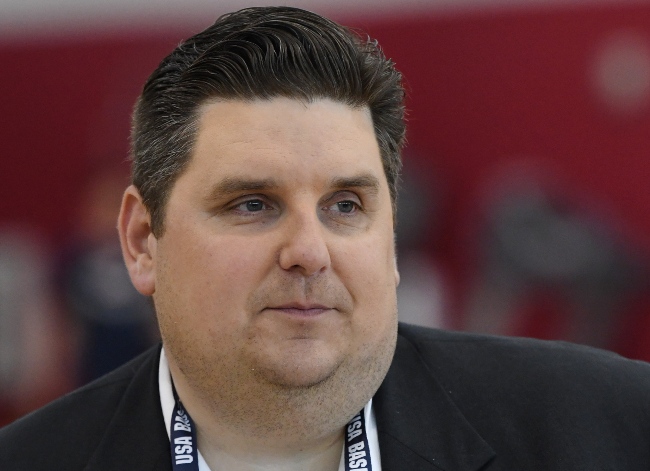
I know you pointed out a few of the deals that, I would imagine, really interest you in the epilogue: Liverpool, Blaze, Uninterrupted, SpringHill Entertainment, all that stuff. Are those the ones that, when you talk about his deals, you find really cool? Are those the ones that kind of stick out above the rest?
So, the deal with Liverpool, to this moment, I am still amazed. I am amazed by the ingenuity of the concept of the deal. When they made the deal, let’s see how old he was … they made the deal in like late 2010, early 2011. He was still in his twenties. The idea that he would chase equity in an English soccer team instead of a check — not even instead of a check, it’s a different type of stock. Like, if you get stock in a company, or you get percentage points in a startup, that’s not unusual. Basically, LeBron traded his global image rights for two percent in an English soccer team. I am not a student of business, but I defy you to go find an athlete deal that’s ever been made like that.
It’s such a complex deal that it’s a hard thing to explain to the public. And not only that, basically I talked to the people at Fenway Sports, this hasn’t been a great deal for them. LeBron really hasn’t done a lot of global endorsement deals with them. In fact, about the same time that he entered into that agreement with them, he really started shifting away from doing straight endorsement deals, and doing more equity deals.
If they had made that deal with him in 2003, it would have been a lot better deal for them. But they just so badly wanted to be in business with LeBron James, and him understanding that the value of somebody wanting to be in business with him and recognizing that how could they get in business together. This is where Paul Wachter, who’s his investment advisor, really came in. To put that deal together, I just think was fascinating. I really could have written on, and on, and on about it. But it is so arcane, that for the sake of the reader, you can’t go too far into it.
That deal, and the deal that they made, the marketing plan with Beats, which was Beats had no money. Jimmy Iovine and Dr. Dre, awesome guys, but they didn’t have a $25 million marketing budget. This wasn’t like when LeBron signed with Kia, and they rolled out a new model of car. Kia is a billion dollar company. When they design a marketing campaign for a car, and have $50 million or $80 million behind it. This is not that.
So, Beats, they were like, “How can we make these headphones popular?” And by getting into business with LeBron, which was super smart by Jimmy Iovine, they basically co-opted the entire Redeem Team, the entire 2008 Olympic team. All those guys were walking around with those headphones on their ears. The concept that you could get … I remember seeing them saying, “What the hell are those?” And hearing they were $300, or $400, going, “You got to be kidding me.” They popularized them, and today, that wouldn’t happen as easily because if you tried to do it today, all the players would realize, “Wait a minute, you’re doing something here, maybe I can get my own headphone deal.”
But back then it was kind of way ahead of game. It took the ingenuity to know that players had become fashion plates when they were going and coming to things. That the way they dressed walking in and out of an arena, or around town, had value. It took the idea that knowing that LeBron had the influence to give a gift that people would actually use. I mean, if it was the assistant coach … Nate McMillan was an assistant coach. If Nate McMillan had given those to everybody, would those guys be wearing them? No offense to Nate, you know what I’m saying, but Nate’s not an influencer.
So, the ability to leverage LeBron’s influence. We didn’t know what an influencer was in 2008. But that’s what the Beats thing was, and then not only that, but the company grows and ends up selling for $3 billion. The ingenuity of LeBron to have a piece of the company instead of taking a check. Those two deals right there, which were made roughly about the same time. Like, really great business, stuff that guys hadn’t done before. When I was putting this book together, that’s the kind of stuff that got me. Like, man, I love telling this story because it’s not something that you tell every day.
Right. Like, there are plenty of athletes who are good businessmen, but there aren’t any other athletes who, like you said, have a whatever percent stake in Liverpool from a deal they made when they were twenty-something.
Right, right, and now, by the way, Liverpool has, like, quadrupled in value.
Yeah.
Not only the concept of getting involved with it, but also getting in with an investment that has exploded. If Liverpool sold today, they’d sell [for] between two and a half, and three billion. LeBron’s investment would have just exploded for them.
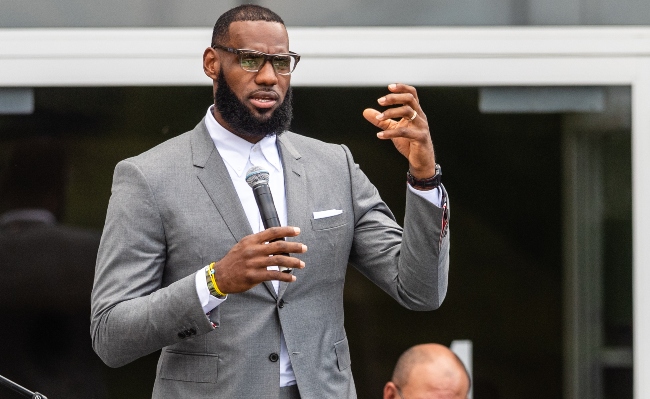
There are plenty of places where LeBron’s game and business acumen intersect, and at the start of the book, you start by talking about how people ask you what the most impressive thing is about LeBron, and you talk about his awareness. Could you go into what makes his awareness so unique?
I think because it’s multi-stage, right? He has awareness that the power forward is leaning to his left, so he can head fake him and throw a lob to a teammate, who can back cut to the guy’s right. So, he has innate awareness on the basketball court of things happening, seeing things before they happen.
He has an incredible awareness of who’s moving in a room. He has awareness of this guy over here is trying to trick me and trap me into this. This guy over here is trying to do this. So, he has awareness just in general vision. And then he has awareness of his place in time. And so the ability for him to know … like, [protesting the death of] Trayvon Martin. I go to this because LeBron realized that his fame and the interest in him was a currency. That’s sort of awareness level one, a lot of people recognize that.
Awareness level two is that he can use that demand to do more things and have more of an impact than just simply sell shoes, or sell Powerade. His leveraging of that elevated him as someone in society. His understanding that I can write a check for this charity, and give it to this charity, or I could do something in a partnership with somebody that not only creates some money, but raises overall awareness.
The Decision for example, that was an incredible awareness move because what he was doing was [saying], “I am capturing value. I am taking something that other athletes give away for free, which is the announcement that people really want. And I’m capturing that value, and then I’m going to use it to channel into charity.” The execution was poor, but the awareness to do that was awesome.
What people don’t realize was there was a Decision Two. There was a second Decision. It happened last summer. What had happened was instead of him doing a television show announcing that he was gonna go play for the Lakers, he just put out a press release, but then he didn’t do any media. When it came time and the media was really interested in talking to him about it, he invited them into the opening of his I Promise School. He used the moment and the attention to shine the light on this great thing that he was doing for this community.
Not only did he basically capture that value, but he then used that platform to show this, and now he’s got other people in other parts of the country wanting to do this same thing. That was him doing the exact same thing. He was taking the interest level in where he was playing basketball and channeling it, he just showed you his growth from The Decision, putting it on television, to The Decision of featuring his school. Both were the same concept. Both were brilliant. The Decision fell flat because of the execution. The I Promise School was wonderful because they learned from the Decision what to do. But what they were doing was essentially the same thing. It took awareness to get to that point, and it took to awareness to improve on it, and it’s that awareness that will drive in him in his moves after his basketball career.
Are there any other really notable areas where you think his game and his business acumen intersect with another?
I think, he’s tried to be ahead of the game in terms of protecting his body, I think he’s tried to be a little ahead of the game in business, too. So, for example, LeBron was convinced that he was gonna have terrible knee problems because he carries so much weight and everything. He was always concerned about his joints, and so really started getting involved in like preventative maintenance when he was like 21.
We’re talking about a guy who, when he first came into the NBA, wasn’t taping his ankles for every game. By the time he’s in his third year, he’s doing these elaborate stretching exercises to really improve and maintain flexibility. All pro athletes discover how to take care of their body after they become pro, but he was even ahead of that curve.
Then I think when you look at what he did in business, which was trying to get ahead of the curve, using social media to basically become an influencer. Basically, starting his own media company, which now all these guys behind him are doing — Curry, and Durant, and Harden, and Chris Paul, same kind of foresight and trying to think about the longterm.
That was one of the amazing things about LeBron to me, was that when he was 18 or 19, that he could think about the long-term. I’m six years older than him, so I was like 25, 26, and I couldn’t believe then how he saw the big picture. Now that I’m older and I look back, I am even more amazed at how he sees the big picture. He saw the big picture basketball wise, and I think he’s seeing the big picture business wise.
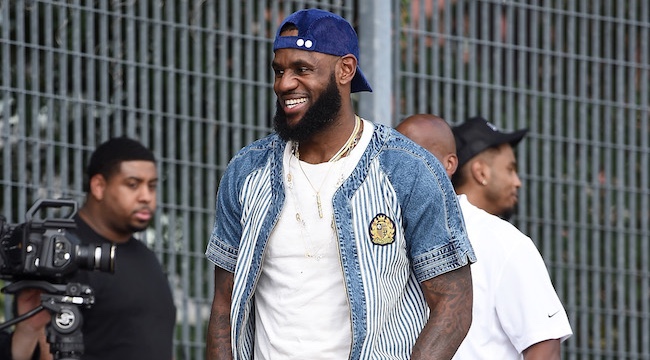
My last question, before you get into the epilogue, you say, “The journey has made LeBron internationally famous, hugely respected, and fabulously wealthy. If you believe him though, he’s still just getting started.” To whatever extent you can answer this, when LeBron looks back on things in 30 to 40 years, how will he define success?
I think it’s gonna evolve. I think a couple of things: One, I think he wants to be able to say that he’s been the most successful athlete/businessman of all time. Which, how is that defined? Boy, I don’t know. Does he own an NBA team, an English Premier League team, 700 Blaze Pizza franchises, a stock portfolio worth $1 billion? I don’t know. But I think that quote that closes the book where he says, “I want it all.” Like, I do believe he feels that way.
The second thing is, I think, he wants to affect as many children’s lives, children from both poverty and challenging circumstances, as he possibly can. I think he would love it if the I Promise School concept became something that took over entire school systems in multiple states, and became a new way to take care of children. I think he has dedicated his life toward helping those kids, giving a hand to those kids that are headed to ruin. He was headed to ruin and he got saved.
He could write a check to all these kids. He has enough money where he could go down and give each one of those kids $10,000. But what he is trying to do by giving them education all the way from … right now it’s third grade, but I’m sure that he’ll want it to be pre-K through college. That he creates thousands of stable happy people, where there may have been thousands of broken lives, and affects societal change.
Maybe he can’t affect societal change ultimately outside a small segment of the population in Akron, Ohio. Maybe that’s laughable to think that he could do it more than that. But he is directly changing the circumstances of several thousand people right now in his hometown, and I know he wants to expand. Thirty years from now, he’s got several thousand people who grew up to become adults who contribute back to society and are having happy and healthy lives, I think he can look to that to say, “I made societal change.”
I think that’s a grandiose thing to say, that he can become super rich and powerful, and also affect societal change. I mean, that is the beginning story of tragic things, where people make these investments that go horribly wrong. But I do think that’s what his goal is, and I think he’s working to get there. And I think if you go back and look, ten years ago he was giving away bicycles to kids, right? This was our deal, “Come, I’ll give you a bike.” Now he’s giving away college tuitions to kids. What’s he going to be giving them in 10 more years, 20 more years? Look where he’s come in 10 years, give him 20, and who knows?
Yeah, I guess we’ll have to wait for his run for President then.
God, I hope not.
This interview has been lightly edited and condensed. Dime was provided an advanced copy of the book in anticipation of its release.






